Issue 8 | Summer 2018
Dear Roca friends,
I’m writing today with mixed feelings. While the past few months have been extremely exciting for us at Roca, it has been a heartbreaking period for our country. With young children being separated from their parents at the border and treated so brutally, I can barely find the right words to describe my feelings.
We stand by those who seek better futures for themselves and their families.
We stand by those who are so often left out.
We stand by those who want to belong.
I hope that the stories we share with you on this issue of Roca Ink. provide some reasons for hope. From opening our new site in Baltimore (!) to cutting the ribbon at our Holyoke site, Roca keeps growing and serving more young people. One person at a time, we are reminded what true change looks like.
This summer, we’re crunching the numbers on the fiscal year that just ended, so we are worthy of working with young people every day. We’re digging deeper into our work with cognitive behavioral theory (CBT), and looking at the work that still needs to happen with criminal justice reform. We’re excited to share all this progress with you!
Thank you for your continued support and for standing by young people and families!
Molly Baldwin
Founder & CEO
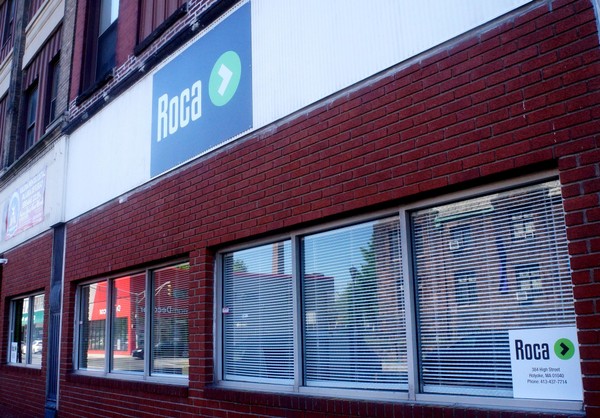
Join Us Tomorrow: Roca Holyoke Ribbon Cutting
We’ve been lucky to have known many young people from Holyoke over the years, but now we finally have a Holyoke home! Tomorrow afternoon, we will cut the ribbon at our fifth Massachusetts location at 384 High Street in Holyoke.
The Grand Opening is a celebration of Holyoke’s young people and the many partnerships that make this work possible. We will be joined by Mayor Alex Morse, State Representative Aaron Vega, Hampden County District Attorney Anthony Gulluni, Hampden County Sheriff Nick Cocchi, Holyoke Police Department Incoming Chief Manuel Febo, and Greater Holyoke Chamber of Commerce President Kathy Anderson.
Roca Holyoke will operate as a satellite office of our main Western Massachusetts site in Springfield. In partnership with the City of Holyoke, we already operate a local transitional work crew, allowing the young people in Holyoke to gain critical work skills while working for their own community. All other Roca signature programming, including CBT, education, and workforce readiness, is offered on-site as well.
Join us to check out the new location tomorrow, Tuesday July 24, 2018, at 4:30 PM at 384 High Street, Holyoke!
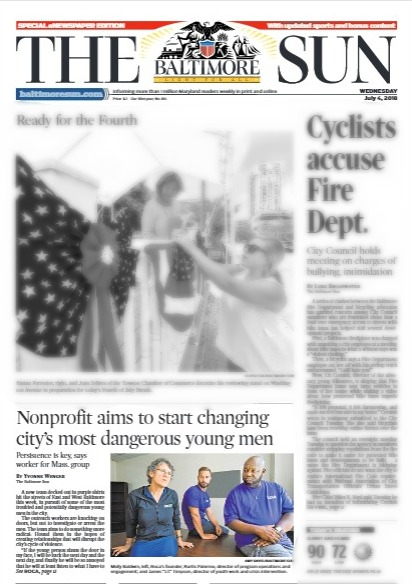
The Baltimore Sun and ABC Baltimore Welcome Roca to the City
The front page of the July 4th edition of The Baltimore Sun featured Roca Baltimore, which started knocking on doors that week. “The outreach workers are knocking on doors, but not to investigate or arrest the men. The team aims to do something more radical: hound them in the hopes of creating relationships that will disrupt the city’s cycle of violence,” the Sun wrote.
WMAR Baltimore, the local affiliate of ABC News, took a trip to Massachusetts to learn what Roca is all about. In a story by Skyler Henry, the audience got to see what outreach in the streets of Boston and Chelsea looks like, what Boston partners say about Roca, and why Baltimore partners are excited by Roca’s approach.
It is a tremendous honor and privilege to start working in Baltimore. Our Baltimore team is already out in the streets, knocking on doors, meeting young people, and getting to know them. We are excited to meet so many partners in the city and we look forward to sharing with you what we learn.
Stay tuned for more updates on our Baltimore page!

30 Years of Relentless Impact: Roca’s Annual Breakfast and Upcoming Community Celebration
Roca is turning 30! And there’s a lot going on!
We kicked off our 30th celebrations a couple of months ago at our Annual Breakfast, with nearly 500 friends, partners, and supporters. We were honored to be joined by John King, former US Secretary of Education, Governor Charlie Baker, House Speaker Robert DeLeo, and a host of remarkable partners who are part of Roca’s success. Check out these inspiring remarks by our guest speakers!
On October 3rd, we will gather at our home site in Chelsea to celebrate with our community 30 years of partnership and impact. All our friends, partners, and graduates are welcome! We will send more updates in the coming weeks, but please already save the date!
What else? We’re collecting 30 stories of our graduates, documenting the lessons we have learned in the past 30 years, and working on a major campaign to build Roca’s next 30 years. More to come!
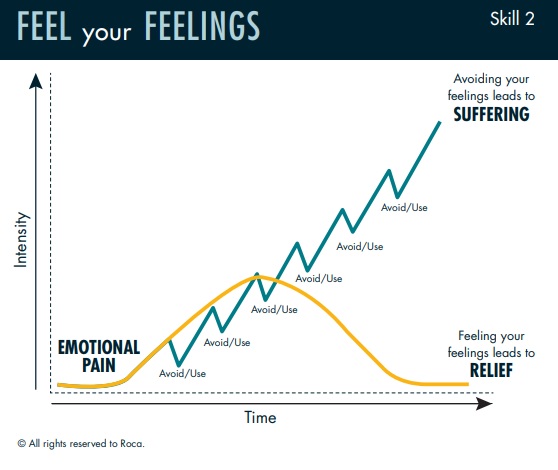
What’s New in Roca’s Work with Cognitive Behavioral Theory (CBT)?
“Now instead of doing a bunch of drugs, I use CBT skill ‘Feel your Feelings’ – I ride the wave, I deal with my feelings instead of fogging my mind” (Chris, a Roca participant)
We’re excited to share with you a new Harvard Kennedy School paper, as part of the Executive Session on Community Corrections, in which Roca took part. The paper tells the story of a project we can’t talk enough about: CBT.
Cognitive Behavioral Theory is an evidence-based practice that has proven effective in reducing violence and criminal behaviors. The only problem: none of the existing CBT programs are designed to reach high-risk young people in the community.
Three years ago, we partnered with Mass. General Hospital Community Psychiatry PRIDE clinic to develop our own CBT curriculum. “Together, we boiled down all the science on CBT and created a simple, useful, and practical curriculum that can be taught in any setting and delivered anywhere,” says Anisha Chablani-Medley, Roca’s Chief Programming Officer. “The only way to have an impact is designing something that makes sense to young people.”
Emily Fish, our Roca Lynn Assistant Director, shares her experience with CBT: “When you are out in the field and so many things are out of your control, having a concrete tool like CBT that you can utilize in your hard conversations with young men is a game-changer. It took our work to a whole new level.”
Our young people took a major part in this incredible project, and we’re still refining and improving based on what we learned. It’s an incredible experience and a game-changer for youth work.
The paper tells the story of creating the curriculum and a few lessons we learned on the way.
Want to learn more? Check out this quick CBT video.
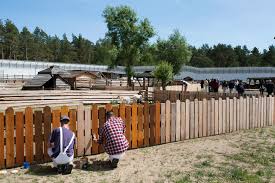
Is Germany Smarter?
When it comes to young adults in the criminal justice system, absolutely.
This spring, Yotam Zeira, our Director of Strategy & External Affairs, joined an educational tour to Germany to learn about their juvenile justice system and correctional facilities. The tour, which was organized by our partners at the Columbia Justice Lab, brought a group of Massachusetts lawmakers, government officials, and other leaders of our criminal justice system, to learn how Germany treats emerging adults ages 18 to 25.
And they definitely do it differently there.
Germany started trying young adults under age 25 as juveniles in 1953. At the beginning, judges were hesitant and used their authority to apply adult law for those between ages 18 and 25 quite liberally. Six decades later, this authority is used primarily for traffic offenses, while the vast majority of other cases involving young adults are tried under juvenile law. Walk into a youth prison in Germany, and you hardly see high-school age teens – 90 percent of inmates are between the ages of 18 and 25. In adult prisons juveniles under 18 are not allowed, and young adults are rarely sent.
Vocational training in Germany’s young adult jails is top notch. The professional certificates young people earn behind the wall can get them high-paying jobs outside, and the criminal record system is designed so that a record wouldn’t be a barrier. If the inmates are immigrants who don’t speak German, the jail’s education staff teach them. When a young person in the jail seems anxious or depressed, correctional officers let them hang out with the rabbits in the jail’s farm. Berlin’s probation officers use their social worker training in their supervision work, and the city’s judges charge court fees only if the young adult is already working and making some money. The efforts of the judges, probation officers, and correctional staff seem to focus on one main goal: to help young people leave their systems in a better shape.
There’s a long way to go and a lot to learn. To see what other participants of the tour thought about the experience, check out Senate Judiciary Chairman Will Brownsberger’s summary here, and reflections from Columbia University’s Vinny Schiraldi here.
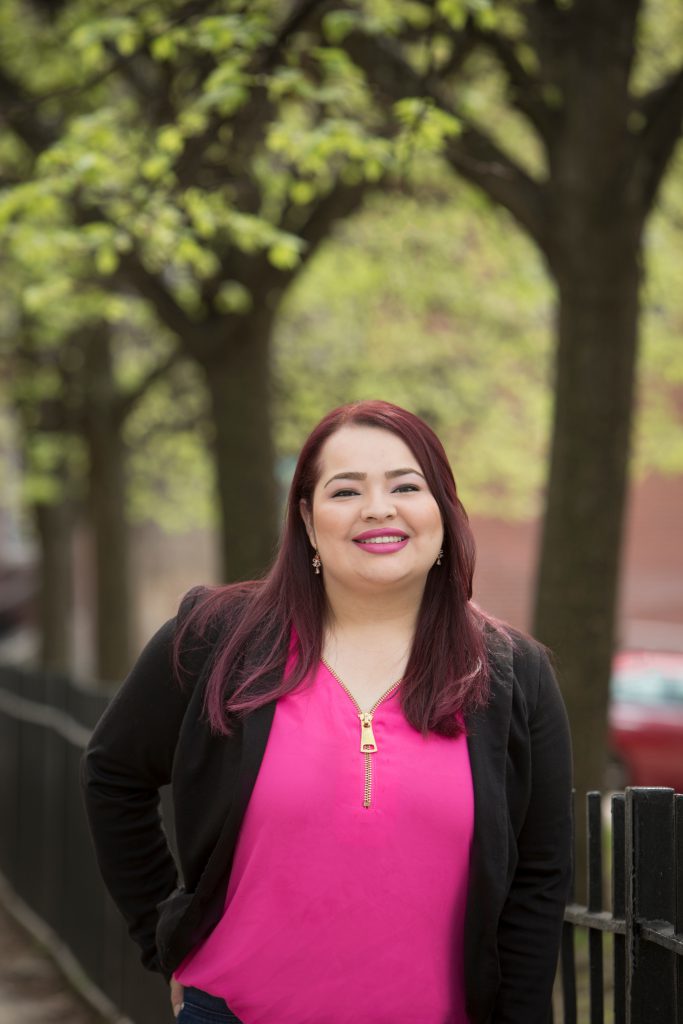
Meet Sandra.
Sandra Lopera was awarded Roca’s Vichey Phoung Award, which celebrates each year young people who made tremendous changes in their lives.
“I was a child taking care of a child,” Sandra describes her life at 17. “When you have a kid, you’re on your own. I felt like I was the only one in the world with a situation like this.”
Up against so much, no wonder Sandra felt hopeless. She grew up in an immigrant family in East Boston with very traditional values, and at an early age was caught up in drugs, alcohol, and a social environment she now calls toxic. When she became pregnant, everyone around her just expected her to figure life out: “In my culture, when you have a child you’re seen as an adult.”
But nothing that makes up adult life really worked out. “I had no support, no education, and was working like crazy,” she remembers. Even first steps like getting a GED seemed like a far off dream that would never be possible. She heard from her doctor about a program called Roca – but even going there felt tough.
But Roca wasn’t going to give up on her.
“Even when I told my Roca youth worker no and I didn’t want to come back, she kept persisting until I did. Patricia believed in me and showed me that I needed to believe in myself.”
From there, the path for making a life for her and her son Brian seemed more possible. After many months of hard work with Roca, she passed her GED and completed a training to becpme a pharmacy technician. Roca helped Sandra get her work permit and enroll in a CNA program at Bunker Hill Community College, where she discovered again how much she loves helping others.
And every time Sandra was ready to give up, Roca was there to support and push.
Life is different now. As a Nurse’s Assistant at Brigham and Women’s Hospital in Boston, and as part of the DACA program, she now truly is a dreamer. “I have dreams of going to college, and owning a house, and being a role model; not only for my son, but for other young women like me.”
Sandra is indeed a role model. “I’ve come so far and I can go even farther, I know it,” she says. We couldn’t agree more.

Roca extends a special thank you to some generous donors for giving in this quarter!*
-
The Abell Foundation Adobe Foundation Anonymous Foundation Bank of America Foundation BGE The Boston Foundation Bushrod H. Campbell and Adah F. Hall Charity Fund Charles Hayden Foundation City of Boston, Mayor’s Office of Workforce Development City of Everett Clayton Baker Trust Exelon First Parish Church of Concord France-Merrick Foundation The Harry and Jeanette Weinberg Foundation The Hearst Foundation James G. Connolly Tribute Fund Klarman Family Foundation Laura and John Arnold Foundation The Leonard and Helen R. Stulman Charitable Foundation Lewis Family Foundation Mabel Louise Riley Foundation Massachusetts Department of Industrial Accidents Massachusetts Department of Transitional Assistance MAXIMUS Charitable Foundation Metropolitan Area Planning Council’s Metro Mayors Coalition Nordblom Family Foundation Santander Bank Sarah Rollins Charitable Trust Silicon Valley Community Foundation T. Rowe Price Foundation TD Charitable Foundation United Way of Massachusetts Bay and Merrimack Valley
*All this in addition to the generous foundation, individual, and corporate support over the last quarter.


